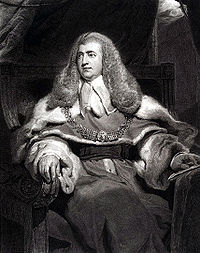
Baron Ellenborough
Encyclopedia

Peerage of the United Kingdom
The Peerage of the United Kingdom comprises most peerages created in the United Kingdom of Great Britain and Ireland after the Act of Union in 1801, when it replaced the Peerage of Great Britain...
. It was created in 1802 for the lawyer, judge and politician Sir Edward Law
Edward Law, 1st Baron Ellenborough
Edward Law, 1st Baron Ellenborough PC KC was an English judge. After serving as a Member of Parliament and Attorney General, he became Lord Chief Justice.-Early life:...
, Lord Chief Justice of the King's Bench
Lord Chief Justice of England and Wales
The Lord Chief Justice of England and Wales is the head of the judiciary and President of the Courts of England and Wales. Historically, he was the second-highest judge of the Courts of England and Wales, after the Lord Chancellor, but that changed as a result of the Constitutional Reform Act 2005,...
from 1802 to 1818. His son, the second Baron, notably served as Governor-General of India
Governor-General of India
The Governor-General of India was the head of the British administration in India, and later, after Indian independence, the representative of the monarch and de facto head of state. The office was created in 1773, with the title of Governor-General of the Presidency of Fort William...
. In 1844 he was created Viscount Southam, of Southam
Southam, Gloucestershire
Southam is a village in Gloucestershire, England, located on the outskirts of Cheltenham. Its main features are a castle, which has now been converted to a hotel, and the Gloucestershire Warwickshire Railway, which runs through the outskirts of the village...
in the County of Gloucester, and Earl of Ellenborough, in the County of Cumberland. These title were also in the Peerage of the United Kingdom. His only son predeceased him and on his death in 1871 the viscountcy and earldom became extinct.
However, he was succeeded in the barony by his nephew, the third Baron. He was the son of the Hon. Charles Law
Charles Law (British politician)
The Honourable Charles Ewan Law QC , was a British judge and Conservative Party politician.-Background and education:...
, Member of Parliament
Member of Parliament
A Member of Parliament is a representative of the voters to a :parliament. In many countries with bicameral parliaments, the term applies specifically to members of the lower house, as upper houses often have a different title, such as senate, and thus also have different titles for its members,...
for Cambridge University
Cambridge University (UK Parliament constituency)
Cambridge University was a university constituency electing two members to the British House of Commons, from 1603 to 1950.-Boundaries, Electorate and Election Systems:...
, second son of the first Baron. In 1885 he assumed by Royal license the additional surname of Towry (which was that of his father's mother). On the death of his son, the fourth Baron, this line of the family failed. He was succeeded by his cousin, the fifth Baron. When he died the title passed to his younger brother, the sixth Baron. the title is held by the latter's grandson, the eighth Baron, who succeeded his father in 1945.
Barons Ellenborough (1802)
- Edward Law, 1st Baron EllenboroughEdward Law, 1st Baron EllenboroughEdward Law, 1st Baron Ellenborough PC KC was an English judge. After serving as a Member of Parliament and Attorney General, he became Lord Chief Justice.-Early life:...
(1750–1818) - Edward Law, 2nd Baron EllenboroughEdward Law, 1st Earl of EllenboroughEdward Law, 1st Earl of Ellenborough GCB, PC was a British Tory politician. He was four times President of the Board of Control and also served as Governor-General of India between 1842 and 1844.-Background and education:...
(1790–1871) (created Earl of Ellenborough in 1844), Governor-General of IndiaGovernor-General of IndiaThe Governor-General of India was the head of the British administration in India, and later, after Indian independence, the representative of the monarch and de facto head of state. The office was created in 1773, with the title of Governor-General of the Presidency of Fort William...
(1842-1844).
Barons Ellenborough (1802;Reverted)
- Charles Edmund Towry-Law, 3rd Baron Ellenborough (1820–1890)
- Charles Towry Hamilton Towry-Law, 4th Baron EllenboroughCharles Towry-Law, 4th Baron EllenboroughCharles Towry Hamilton Law, 4th Baron Ellenborough -Biography:He was the only child of Charles Edmund Towry-Law, 3rd Baron Ellenborough and his second wife, Anne Elizabeth Fitzgerald-Day. His parents were married at Lymington on 28 June 1855, and he was born on 21 April 1856...
(1856–1902) - Edward Downes Law, 5th Baron Ellenborough (1841–1915)
- Cecil Henry Law, 6th Baron Ellenborough (1849–1931)
- Henry Astell Law, 7th Baron Ellenborough (1889–1945)
- Richard Edward Cecil Law, 8th Baron Ellenborough (b. 1926)
The heir apparent
Heir apparent
An heir apparent or heiress apparent is a person who is first in line of succession and cannot be displaced from inheriting, except by a change in the rules of succession....
is the present holder's son the Hon. Rupert Edward Henry Law (b. 1955)
The heir apparent's heir apparent is his son James Rupert Thomas Law (b. 1983)

